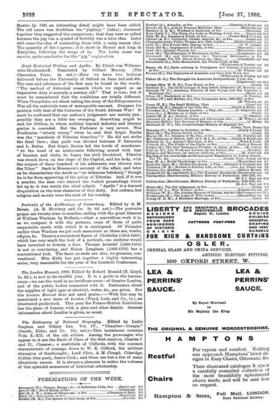Greek Historical Writing and Apollo. By Ukiah von Willamo- witz-Moellendorff.
Translated by Gilbert. Murray. (The Clarendon Press. 2s. net.)—Here we have two lectures delivered before the University of Oxford on June 3rd and 4th. The sum and substance of the first may be found in the words : "The method of historical research which we regard as an imperative duty is scarcely a century old." That is true ; but it must be remembered that the conditions are totally different. When Thucydides set about telling the story of the Peloponnesian War all the materials were of manageable amount. Compare his position with that of the historian of the South African War ! It must be confessed that our author's judgments are mainly just ; possibly • they are a little too sweeping. Something might be said for Gibbon, to whom nothing beyond industry and literary genius is conceded. But the Professor is very severe. Was Posidonius "utterly wrong" when be said that Scipio Nasica was the "murderer of Tiberius Gracchus " ? He did not strike the fatal blow; that guilt was divided between P. Satureius and L. Rufus. But Scipio Nasica led the horde of murderers. "At the head of an aristocratic following armed with legs of benches and clubs, he began the civil bloodshed. Tiberius was struck down on the slope of the Capitol, and his body, with the corpses of three hundred of his adherents, was thrown into the Tiber." Such is Mommsen's account of the affair, and later on he characterises the deeds as "an infamous butchery," though he is far from approving of the policy of Tiberius. And, if it was a murder, the man who started the violent proceedings which led up to it was surely the chief culprit. " Apollo " is a learned disquisition on the true character of this deity. Not culture, but religion and morals were the note of his worship.






















































 Previous page
Previous page